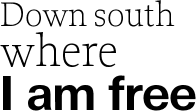|
 MAGINE
this hypothetical situation: New Zealand referenda become binding
on governments and Kiwis vote for partition of the country along
the Cook Strait separating North and South Islands. I would choose
to live in the latter. MAGINE
this hypothetical situation: New Zealand referenda become binding
on governments and Kiwis vote for partition of the country along
the Cook Strait separating North and South Islands. I would choose
to live in the latter.
The climate may be cooler, but to compensate for
that, the days are longer in the summer and, most importantly, people
are just that much more fair dinkum.
This peculiar Australasian term is harder to define
than the Danish-conceived jantelagen (Lucire,
June 30, 2002) but it means something along the lines of ‘genuine’
or ‘honest’. In the Otago area, where Dunedin is the principal
city, there’s plenty of genuine behaviour that puts New Zealand’s
North Island cities to shame. Being a long-time resident of Wellington
and a frequent traveller to Auckland while I am Down Under in its
warmer months, we North Islanders have a lot to relearn.
For all that Mr Peter Jackson has done for the
film industry, he will probably be the first to tell you that when
it comes to enacting new policies—such as tax breaks for filmmakers—the
Wellington establishment is the first to say, ‘No.’
| Here, there is a greater
sense of “being a New Zealander” than in any other
city. Elsewhere there is a parochial
and inappropriate desire to divide people into groups of Caucasian,
Maori, Asian and so forth |
Which is why, of course, Wellington is such a fine place to have
a political capital, where Sir Humphrey Appleby would have a field
day rejoicing at the State Opera House and the advertising-free
Concert FM station on the wireless.
Politicians do their darnedest to hold people back with economical,
theoretical claptrap that serves people far less than simply being
genuinely Kiwi.
We'll take none of this Applebyism, thank you
very much, say the Dunedinites. In the series of interviews I conducted
with the city’s fashion designers—one has run, and several
others are forthcoming at the time of writing—it was not surprising
to hear of established designers literally creating competitors
from people who asked them to lend a hand. This struck a chord—after
all, it is a principle on which this magazine was founded. If we
at Lucire had a constitution, this would be on it. If this
country had a constitution, this should be on it. There
is no procrastination and finding reasons not to do things. Dunedin
people roll up their sleeves and muck in.
There was no better example than the ID
Dunedin Fashion Show, which I had come to attend. Dunedin City
Council’s Jennifer Hooker was able to arrange my trip here
with Ryan Craig of Tourism Dunedin within days: it’s hard to
see that happening in some other places. The show arrangements themselves
were impeccable, right down to the goodie bags and the seating.
When it comes to goodie bags, size matters—we were made to
feel a trifle more special with Arthur Barnett bags that were larger
than the regular audience’s.
At the world’s longest catwalk, fashion media
were grouped together—myself with Stacy Gregg of the Sunday
Star–Times—and everyone just felt happy. The stress
had disappeared.
It was not confined to the fashion industry, but
was apparent everywhere: taxi drivers and chauffeurs would engage
you in a conversation about how to fix things in society and before
long, you'd discover that they, or an extended family member, had
embarked on a venture to do just that. After being ferried from
Dunedin Airport to Cargill’s Hotel (678 George Street, 64 3
477-7983, www.cargills.co.nz)
by Classic Jaguar Limousines (see
Lucire, March 6, 2003) and before I rented a car from
Hertz, I discovered southern hospitality with Dunedin’s bus
drivers—whom, unlike certain politicians of both the ruling
party and one other, didn’t act surprised that a non-Caucasian
of east Asian origin hopped on to his vehicle.
Dunedin is far from hick, which is the image I
had been given in the North Island. In fact, it proved to be more
cosmopolitan, evidenced by, for example, a female mayor of Indian
ethnicity. And the Chinese have arguably been here longer than in
any other place in New Zealand. Here, there is a greater sense of
“being a New Zealander” than in any other city. Elsewhere
there is still a parochial—and inappropriate for a nation of
fewer than four million—desire to divide people into groups
of Caucasian, Maori, Asian and so forth.
Service, in general, was superior in this city
when compared to any other in New Zealand—probably another
reason people are happy to help each other. If you live in a civilized
town and are not annoyed at poor treatment, you have a clearer head
to perform your tasks. Dunedin might not voice that point-blank,
but it’s there, underlying everything people do. ‘It’s
freedom, baby,’ as Austin Powers said. ‘Now we have freedom
and responsibility.’
Another example of the freedom–responsibility
connection was at Hertz’s Dunedin depot (121 Crawford Street,
64 3 477-7385), which was accommodating—while I had rented often
enough from the company in the United States and Europe, it was my
first time Down Under and the folks there went out of their way to
get me a smaller car when all they had in the fleet during my phone
call were full-sized Ford Falcons. It was all a far cry from the moment
my Air New Zealand flight touched down in Dunedin.
 IRST
IMPRESSIONS were good but not great. It was the first time
I had come in on a runway and spotted dairy cattle next to it. While
cows weren’t roaming beneath where planes should be taxiing—they
were fenced and a very safe distance away, so there were no signs
such as ‘Mooove away’—it’s not what I expected
to see after airports like Frankfurt and Singapore, with spacious
sterility their aim. IRST
IMPRESSIONS were good but not great. It was the first time
I had come in on a runway and spotted dairy cattle next to it. While
cows weren’t roaming beneath where planes should be taxiing—they
were fenced and a very safe distance away, so there were no signs
such as ‘Mooove away’—it’s not what I expected
to see after airports like Frankfurt and Singapore, with spacious
sterility their aim.
It’s easy to take this jab at Dunedin, a
city founded by Scottish Free Church and reputed to be an antipodean
Edinburgh (note the name similarity). It later became apparent that
any Dunedin joke—like many American jokes—are founded
in a sense of envy.
CONTINUED

|
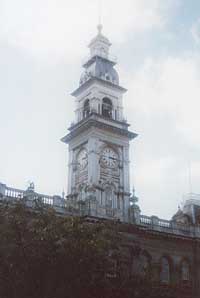
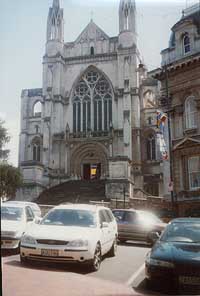
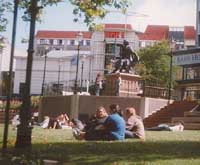
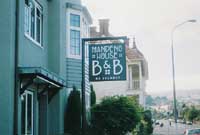
TOP OF PAGE: Dunedin’s
Municipal Buildings housing the Visitor Centre and ground-floor
restaurant, the Hungry Frenchman. The impressive St Paul’s
Cathedral stands behind. ABOVE,
FROM TOP: The clock tower above the Municipal Centre.
St Paul’s Cathedral in the Octagon. The statue of Robert Burns,
honouring Dunedin’s Scottish heritage. Another example of the
Scottish heritage: the sign for Mandeno House on George Street,
in the Charles Rennie Mackintosh lettering.
|
